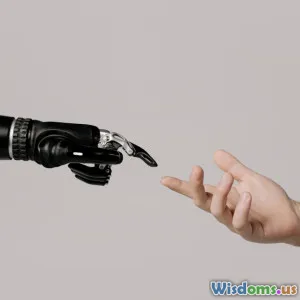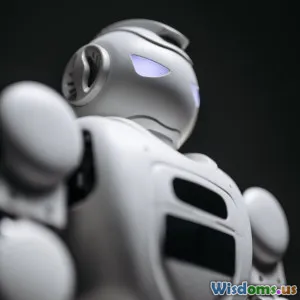
AI and Humanity: A Symbiotic Future
8 min read Explore how AI and humanity can evolve together in a symbiotic future, blending technology with ethics and culture. (0 Reviews)
AI and Humanity: A Symbiotic Future
In science fiction, the future of humanity intertwined with artificial intelligence (AI) has long been a captivating topic—from benevolent robotic companions to dystopian machines ruling over mankind. But as current technology rapidly advances, this once speculative vision approaches reality. The question transforms from "Will AI change the future?" to "How will humanity and AI coexist in a symbiotic future?"
This article explores that trajectory with an eye on scientific innovation, ethical considerations, and cultural evolution. Grounded in real-world examples, it provides a thoughtful roadmap for envisioning a future where humans and AI enrich each other's existence.
The Rise of AI: From Tool to Partner
Initially, AI was a tool designed to execute specific tasks—calculating complex equations, performing route optimizations, or recognizing patterns in data sets. Modern AI's progression, however, has transcended mere automation.
From Narrow AI to General AI Aspirations
Today, AI systems like GPT-4, IBM Watson, and DeepMind's AlphaFold reflect the growing capabilities of narrow AI—highly specialized yet remarkably effective at specific tasks. AlphaFold's protein structure predictions, for instance, have accelerated biomedical research by reducing what once took years down to hours.
The ambition goes further: general AI (AGI) aims to mimic human cognitive flexibility, reasoning, and creativity. Though still theoretical, progress in areas like reinforcement learning and neuromorphic computing fuels this aspiration.
These advancements set the stage for AI not just to serve but to collaborate with humans across multiple domains.
Ethical Frontiers and Societal Challenges
The integration of AI into daily life raises complex ethical concerns requiring proactive and nuanced responses.
Addressing Bias and Fairness
One notable challenge is preventing algorithmic bias. A 2019 study by MIT revealed that commercial facial recognition software exhibited up to 34.7% higher error rates for darker-skinned females compared to lighter-skinned males. Such disparities can perpetuate inequality in critical areas like law enforcement or hiring.
Efforts to create equitable AI include diverse dataset curation, transparency in algorithm design, and external audits. Organizations like the Partnership on AI and conferences such as NeurIPS emphasize responsible AI practices.
Data Privacy and Autonomy
AI's hunger for data prompts questions about privacy and human autonomy. As smart assistants listen and predict preferences, who owns that data? How is it protected? Legislations like the EU’s GDPR and California’s CCPA have begun addressing these concerns, but ongoing vigilance is essential.
Philosophers also debate the implications of AI systems interpreting and predicting human behavior—blurring lines between influence and manipulation.
Synergistic Applications: Augmenting Human Potential
Far from replacing humans, AI in many domains enhances creativity, productivity, and problem-solving.
Healthcare Revolution
AI applications in healthcare illustrate this partnership vividly. The AI-driven analysis of medical images enables earlier diagnoses of diseases like cancer, increasing survival rates. For example, Google's AI algorithm for breast cancer screening has demonstrated a 5.7% reduction in false positives.
Moreover, AI personalizes treatment plans based on vast genomic and clinical data, shifting healthcare from reactive to predictive.
Creative Expression and Innovation
Artists and designers harness AI tools to co-create novel artworks, music, and fashion. Projects like OpenAI's DALL-E generate visual concepts from textual descriptions, fostering new realms of inspiration.
In engineering, AI accelerates new materials discovery or design simulations, compressing development cycles.
Shaping Smart Cities
Cities integrate AI via traffic flow optimization, energy management, and emergency response systems. Singapore’s smart city initiatives use AI to enhance sustainability and quality of life, improving urban living.
Cultural Evolution: Redefining Humanity
AI’s integration invites more than technical adaptations; it demands societal and cultural transformation.
Education in an AI-Augmented World
Education is evolving to emphasize human-AI collaboration skills, creative thinking, and emotional intelligence. Adaptive learning platforms personalize curricula, improving engagement and outcomes.
Workforce Shifts and New Opportunities
While AI automates routine jobs, it simultaneously creates novel roles—AI ethics officers, data curators, and creative technologists. Seamless retraining programs become crucial in this transition.
Philosophical Reflections
AI challenges human self-perception. The rise of machines with cognitive capabilities provokes philosophical questions about consciousness and identity. These reflections foster greater appreciation of human uniqueness while embracing machine strengths.
Building a Synergistic Future: Steps Forward
Collaborative Governance
Responsive policies require collaboration between technologists, policymakers, ethicists, and the public. Frameworks like the IEEE’s Ethically Aligned Design provide guidance.
Continuous Dialogue
Open, inclusive discourse nurtures trust and adaptability. Public engagement initiatives demystify AI, addressing fears and misconceptions.
Responsible Innovation
Innovation must prioritize societal well-being, environmental sustainability, and justice as core principles.
Conclusion: Co-Creating Tomorrow
The narrative of AI and humanity is evolving from separation or conquest to symbiosis. The powerful technologies today offer unprecedented opportunities for amplifying human capacities and tackling existential challenges—from climate change to healthcare.
Yet the success of this shared future hinges on human values shaping AI’s development and ensuring technologies serve as partners—not replacements. By embracing ethical innovation, cultural renewal, and inclusive policies, we can craft a future where human creativity, empathy, and wisdom flourish alongside intelligent machines.
As author and futurist Ray Kurzweil once said, "Humans and machines will merge to create a new being...a new species." This vision isn't fantasy but an opening act for a profound journey—one where science fiction inspires sci-fi(rst person) reality.
References and Further Reading:
- Jumper et al. (2021), "Highly accurate protein structure prediction with AlphaFold," Nature.
- Buolamwini & Gebru (2019), "Gender Shades: Intersectional Accuracy Disparities in Commercial Gender Classification," Proceedings of Machine Learning Research.
- Google Health (2020) breast cancer screening AI study.
- IEEE Global Initiative on Ethics of Autonomous Systems, "Ethically Aligned Design."
Rate the Post
User Reviews
Popular Posts




















